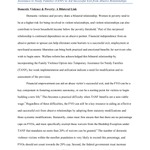The Cost of Leaving: Reforming the Family Violence Option (FVO) under Temporary Assistance to Needy Families (TANF) to Aid Successful Exit from Abusive Relationships

View/
Author
Varghese, Rebecca M.
Subject
Washington and Lee University, Shepherd Poverty Program
Poverty
Family violence
Victims of family violence -- Services for
Temporary Assistance for Needy Families (Program)
Metadata
Show full item recordDescription
Rebecca Varghese is a member of the Class of 2017 of Washington and Lee University School of Law. Capstone; [FULL-TEXT FREELY AVAILABLE ONLINE] This paper first examines the framework of TANF. This informs the kinds of hurdles an individual, particularly a domestic violence victim, must overcome to be considered eligible for TANF benefits, and the difficulties in obtaining a TANF appointment while trying to successfully and permanently exit an abusive relationship. Because of the administrative and bureaucratic difficulties at this step, many victims will find that the difficulties outweigh potential TANF benefits, which are deliberately non-viable wages. Second, for those who have managed to maneuver these barriers, certain TANF requirements are exceptionally difficult to meet for domestic violence victims, a population that is at a significantly higher risk for abuse. Compliance with these requirements is often mandatory in order to continue receiving benefits. Disjointed FVO programs from state to state (even county to county) may force an abuse victim to remain in the same state in order to prevent revocation of benefits because of non-compliance. During this process, the greatest and potentially life-saving benefit to a victim may be the presence of an advocate who is confidential, independent, and trustworthy. Third, underutilization of the FVO is examined and modifications are considered. [From introductory section]